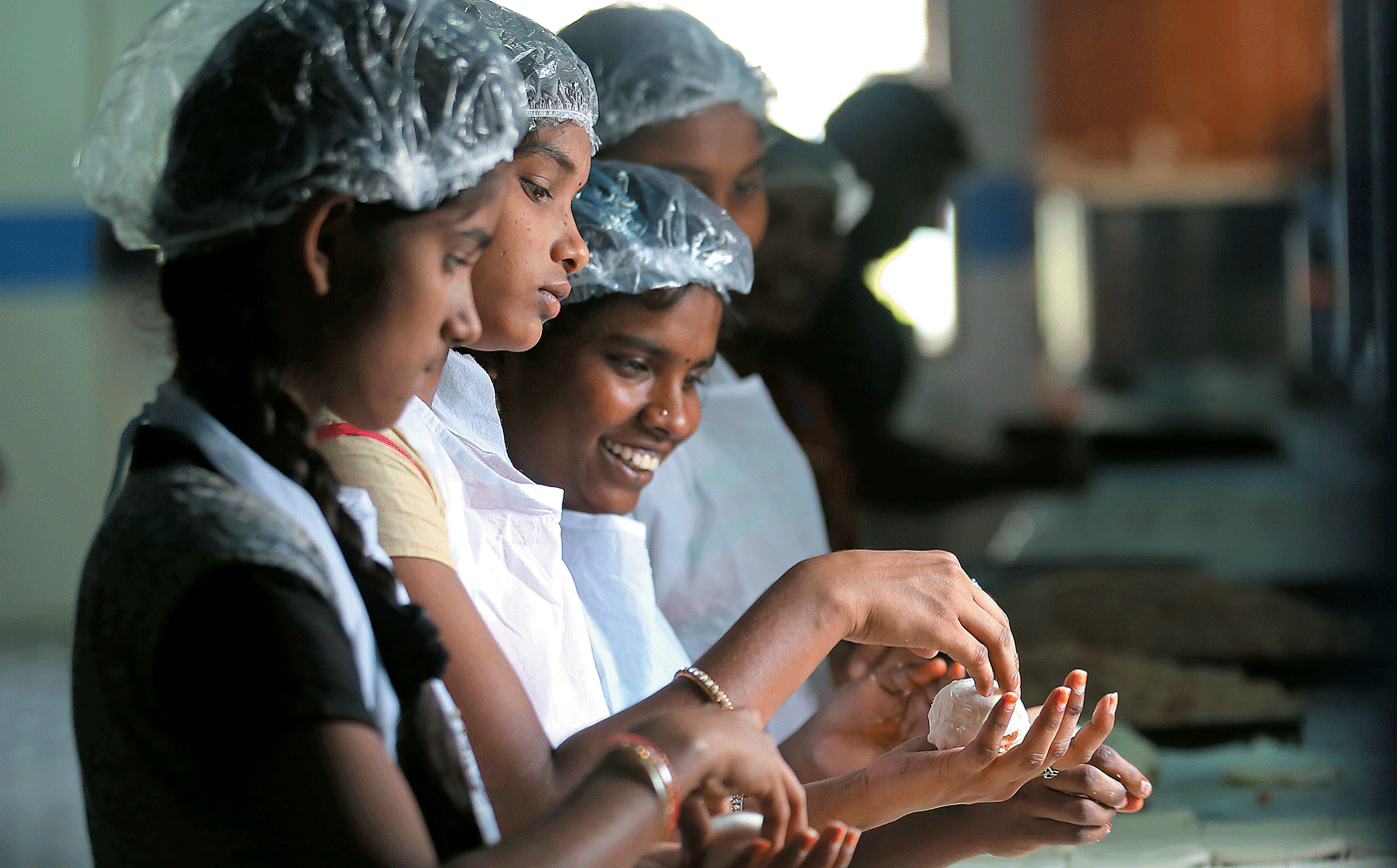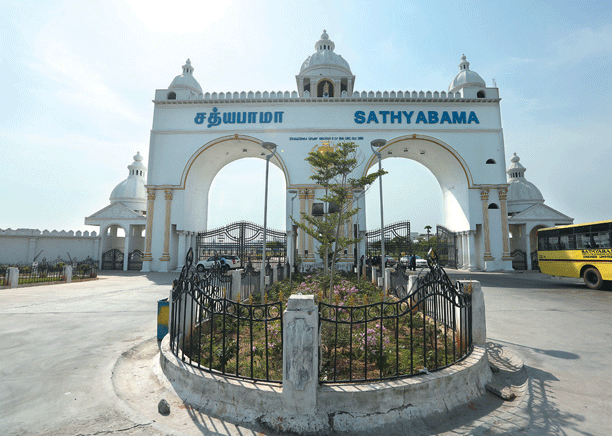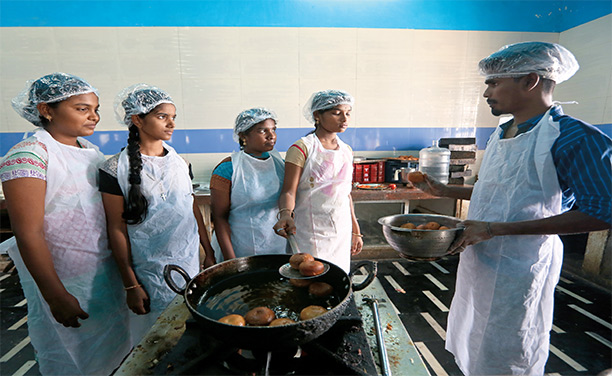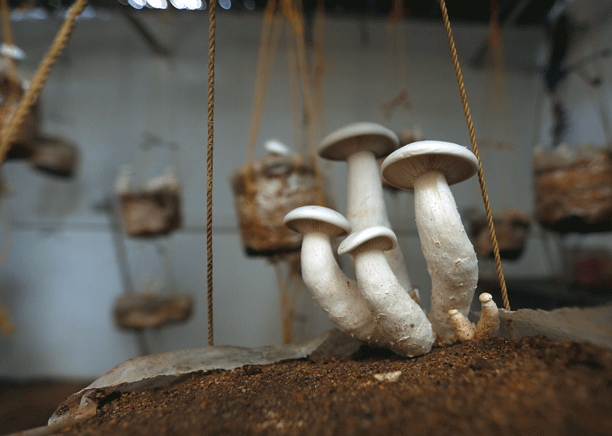
THE ART OF GIVING
Sathyabama Institute of Science and Technology
On first look, it is just like any other
educational institution, spread
across 134 acres with lush green fields and white painted buildings
reminiscent of the bygone. Inside, there is a lot of activity in this
university which focuses on science and technology and also teaches
engineering, arts and science, dentistry, law, architecture and
management. It is one of the old universities that has been around
for three decades.
Founded in 1987 by Dr. Jeppiaar, as a Christian minority institution,
Sathyabama University started as Sathyabama Engineering College in
Chennai's Rajiv Gandhi Salai. It received a Deemed University status
in July 2001 and became Sathyabama University. Today it has 40
Undergraduate and 18 Post Graduate and Doctoral programmes in
which 3400 students are enrolled each year.
With excellent infrastructure facilities including modern laboratories,
library with multimedia facilities, internet and other general amenities,
Sathyabama University is today one of the best equipped universities
to impart education in the area.

Towards Community's Hygiene: Girls making sanitary pads at an in house unit.
But apart from education, one of the major visions of the
university is to serve the community at large. As such, with support
from the management, the university has been strengthening
its developmental activities in bearing fruits of research for
betterment of the society. With a motto of “Together for a better
tomorrow,” the university believes in imbibing community values
among students with the mantra “Joy of living is in joy of giving”.
The
university goes out of its way in community development
and fulfils its corporate social responsibility (CSR) by allocating 1
per cent of the University budget towards CSR which it has been
doing for the last almost two decades having been involved in
CSR activities for the last 18 years. The university has several
programmes for women, young girls and children with an aim to
make them employable and impart in them skills that will hold
them good in the future.
There is a steady stream of resettled people from
the nearby
areas of Cooum and Adyar who need livelihood as they were
deprived of their work mainly due to natural calamities. Some of
the programmes undertaken by the university are targeted with
women in mind which includes the beauty business and making
of household and women-centric products.
As the beauty business is a big draw
among all urban and rural
people, this is one of the areas that the University focuses to train
women for. For this, it has tie-ups with large beauty salons in thearea including
Green Trends, Naturals, Anoushka and Tony and
Guy. Here women are trained by experts for this vocation in a
45-day course which is decided by the Sathyabama University.

Women being trained at Women Empowerment Bureau of Sathyabhama
There is even a Women Empowerment Bureau which works
for the students and staff and conducts outreach programmes
for the communities. During the 45-day course, three-day
workshops are also held to give the women hands-on training.For this, the
University works with several NGOs to bring in
specific skills to the people and also works with MSME industry.
It also works on Entrepreneurship Development Programmes
to develop entrepreneurship among the women and men of
the area. The University also has an outreach programme for
marginalized women in the area and has several programmes
for their upliftment and livelihood.
For men there are programmes too.
The university gives
training to men from the neighbouring areas in carpentry and
in electrical works which are in demand in the city.
There are
also basic computer courses for Class 10 students from nearby
villages.To extend the community work beyond the university campus,
Sathyabama University has adopted 10 villages in Kancipuram
district. The university trains villagers in organic farming and
provides organic fertilizers which is developed and patented in
the University. For keeping developments closer to the ground,the university
promotes indigenous practices in all its activities.
All training and materials
and manure are provided free of
cost by the university. In addition, it also provides transportation
and food free of cost to the women and all who are trained in
the campus. As a special activity, the university has extended
the same courses to acid victims in the state and provide them
all facilities and train them for livelihood.

In the centre of the sprawling campus is a modern bakery
which is central to the University’s CSR activities. The fully
equipped bakery has been imparting training on baking to
women from nearby villages for the last 7 years starting in 2012.
Till December 2018, about 650 women have been trained in
baking skills and in making cakes, muffins, savories and other
confectionary products. The products from the bakery are
served to students in the university’s various canteens.
The university
has employed qualified bakers from across
the city to teach the women to become self-sufficient and
attain economic freedom thereby extending a helping hand in
making women in the community employable. The university
also has tie-ups with prominent bakeries across the city from
which they routinely get experts to train the village women.
The university’s efforts in training the women
actually goes
beyond just training them in baking skills. The university even
assists the women in getting employment in bakeries in the city
and beyond. Today women trained in the Sathyabama bakery
are employed at prominent bakeries across Chennai, including
Cakes and Bakes, French loaf, CK Bakery, McRennett etc. to
name a few. Some enterprising students from the bakery have
even gone on their own and started their own bakery ventures
turning a new leaf in entrepreneurship.At a little distance from the bakery unit is
a unit that trains
young girls in making sanitary pads. The unit trains girls to produce these pads
from scratch as a means of livelihood
and also develop entrepreneurship among the girls. The pads
produced in the unit are distributed among villages, schools and
police women. The unit produces 250 bags of pads every month.
More than 300 women have been trained in the sanitary pad
making unit. The women who have been trained here are selfemployed
as they use their skills and earn either as individuals
or form teams of two or more members and collectively invest
in their business usually promoted from their homes.
Training on tailoring is
being conducted from 2014 and
about 250 women are trained. An independent unit in the
campus trains women and girls in stitching and tailoring
under the watchful eyes of some senior experts. About six
women who have been trained in the tailoring unit have been
employed as tailors at the university. Many others have gone to the city and joined
tailoring units or set up their own thing.

Girls at the skill development and training centre
The university has adopted six villages and 14 schools associated
to these villages. The people trained are usually residents of the
adopted villages. Also the women from resettled communities
which were evacuated from the banks of Adyar and Cooum
since the 2015 floods in Chennai are also beneficiaries of the
university’s programmes. Skill development programmes are
conducted as a source of alternative income generation to these
women.
The university is also actively involved in technology transfer
to the society apart from imparting skills training. Innovative
technology developed at the various research and development
centres at the University are being transferred to the rural women
for promotion of their livelihood. Seaweed culture, mushroom
cultivation, ornamental fish culture are some of the activities
successfully imparted to more than 1000 rural women in coastal
villages by the university.
Apart from promoting education among local communities by providing educational aides, computers and science laboratories, the university also undertakes activities to spread awareness on health and hygiene, gender sensitization, vocational training for school dropouts and teachers’ training programmes every year with an aim to eradicate illiteracy amongst rural communities.

Mushrooming success: The indoor mushroom culture unit at the University.
Scholarships are also provided to underprivileged meritorious
students and also students who excel in sports for their higher
education.
The University provides sponsorships to more than 400 students
including persons with disabilities, children of war widows,
tsunami victims, and acid attack victims. These sponsorships
are initiated to improve and promote access to good quality of
higher education. And this free of cost.
At present the Sathyabama university campus is catering to
20,000 families in and around the campus. The university has a
clear vision of serving the community and developing its people
to have proper employability and livelihood. In the last decade
or so, it has moved far ahead in this direction and continues its
journey towards this noble cause.




